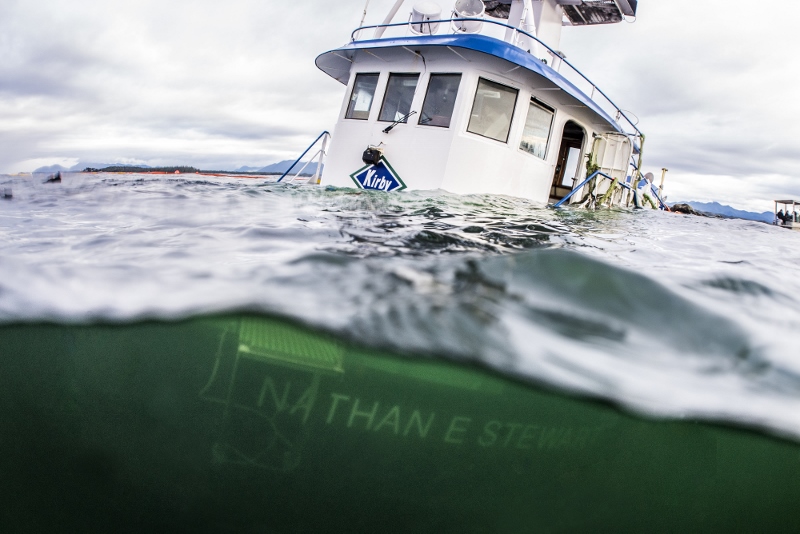A Canadian court has fined Houston,Texas-based Kirby Offshore Marine Corp. $2.9 million (US $2.2 million) for the October 2016 grounding and fuel spill of the tugboat Nathan E. Stewart in British Columbia’s Inside Passage.
Some 29,000 gallons of diesel and lubricants spilled in the accident, which happened when the second mate piloting the articulated tug-barge unit fell asleep while on watch and missed a planned course change, according to Canadian and U.S. investigators.
Kirby, the largest U.S. tank barge operator, has a major presence in the Northwest delivering fuels between Seattle and Alaska. The Nathan E. Stewart was pushing an empty barge to the Port of Vancouver when the grounding happened in the early morning hours of Oct. 13, 2016.
The barge was decoupled and recovered, but the tug sank and remained there for weeks.
The spill fouled fishing grounds of the indigenous Heiltsuk Nation, forcing a shutdown of commercial clamming, finfish harvest and local subsistence fisheries. The accident brought more pressure on the Canadian government from First Nation and environmental groups to do more to prevent maritime accidents and spills, and pre-position resources for faster spill response.
“We both know this sentence does not represent true justice,” Heiltsuk Chief Marilyn Slett wrote in a public open letter to Kirby CEO David Grzebinski after the Tuesday sentencing. “True justice would mean paying for an environmental impact assessment, admitting civil liability, and working openly and honestly to address compensation and remediation for the harm caused by the spill.
“You should work with us to help reform antiquated marine pollution compensation laws, rather than hiding behind them.”
The Heiltsuk Nation placed an advertisement in the Houston Chronicle newspaper asking readers to petition Kirby to do more in addressing consequences of the accident, part of a campaign with allies to also challenge the constitutionality of Canadian law defining liability for oil spills.
In a statement Kirby officials said they have changed how they operate in the Pacific Northwest, following recommendations by the Transportation Safety Board of Canada.
“We sincerely regret this incident, and we have amended our operating procedures, training, auditing, promotion protocols and equipment to help reduce the potential for future accidents,” the company said. Those reforms included wheelhouse alarms to warn other crew of inattention at the helm, and better awareness of fatigue risks.
The safety board leveled sharp criticism at the six-hour watch cycle, common in the maritime transport industry and in use on the Nathan E. Stewart on the night of the accident. The six-on, six-off watch system contributed to the grounding because the second mate had not gotten enough rest during his nominal time off-watch during the transit, investigators found.
Kirby pleaded guilty in May to two counts of violating the Migratory Birds Convention Act and Fisheries Act, for depositing a harmful substance in water, and one count of violating the Pilotage Act for proceeding in a compulsory pilotage area not under the conduct of a licensed pilot or the holder of a pilotage certificate. Kirby entered into a plea agreement to pay the fines, which go into an environmental restoration fund.
At the Provincial Court hearing in Bella Bella, the Heiltsuk community near the accident site in the Seaforth Channel, Heiltsuk members presented victim impact statements. Slett’s public letter was released after the court decision approving the plea bargain, and criticized Kirby for not doing more.
“In an effort to split our civil case between two different courts, your lawyers are attempting to exhaust our resources and to drastically limit your liability instead of compensating us for harms to our aboriginal rights and title,” Slett wrote.
“Our community has laid out a clear path for reconciliation between your company and the Heiltsuk Nation that begins with participation in traditional ceremonies, and concludes with appropriate funding for an environmental impact assessment, ecological restoration, marine response, and annual compensation for the loss of our food fisheries and our commercial clam fishery until it can be reopened.
“Until these conditions are met, your ships are not welcome in our territorial waters.”







